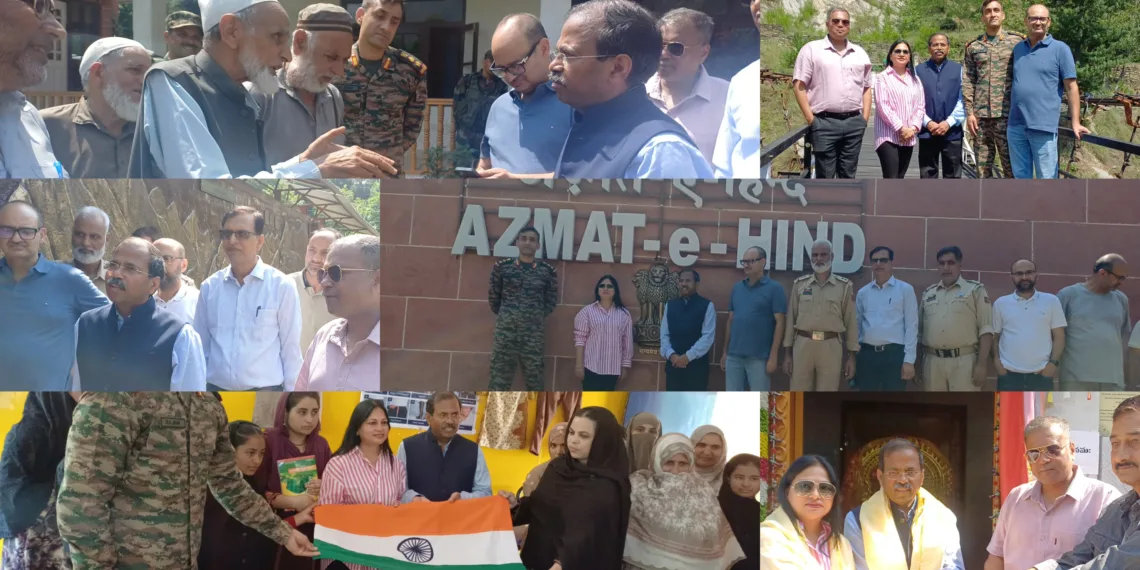Karnah, August 3, 2025 — Principal Secretary to the Government of India for Public Works (R&B) and Mining, Anil Kumar Singh IAS, accompanied by his wife and senior Army officers, conducted a comprehensive visit to the Karnah sector today, reaffirming the government’s commitment to border infrastructure, cultural unity, and community empowerment.
The visit began at the Teetwal Crossing Point (TCCP) Zero Line, where the Principal Secretary witnessed the stunning natural beauty and strategic significance of the region along the Kishanganga River. He lauded the Indian Army for their unwavering vigilance and dedication in safeguarding the nation in one of the country’s most challenging terrains.
At Azmat-e-Hind, beneath the majestic 104-ft National Flag, he paid a heartfelt tribute to the bravery and sacrifice of Indian soldiers. He described the tricolour as a proud symbol of India’s unity and courage, and highlighted how monuments like these not only inspire patriotism but also hold vast potential for boosting border tourism. He noted that the site has already become a point of attraction for visitors and has the potential to generate livelihood opportunities for local communities through homestays, guides, and handicraft promotion.
A touching moment occurred at the Titwal Cultural Development Centre, where students and staff of the Skill Centre jointly presented a locally handcrafted National Flag (Tiranga) to the Principal Secretary. Overwhelmed by the gesture, Shri Singh thanked the group, calling the Tricolour a symbol of pride, identity, and sacrifice, and praised the use of local craftsmanship in its making. He said such initiatives not only instill patriotism but also promote the traditional skills and creativity of border communities.
He also took time to interact with young girls and women enrolled in the Army-supported skill development programmes, commending their spirit and the Indian Army’s unwavering efforts in enabling education, women’s empowerment, and social upliftment. He emphasized that true development is rooted in grassroots initiatives that nurture human potential.
A highlight of the day was the visit to the sacred Sharda Devi Temple and the adjacent Gurudwara, both situated on land graciously donated by the local Muslim community — a powerful symbol of the secular, syncretic fabric that defines Jammu and Kashmir. The Principal Secretary and his wife were warmly welcomed with a token of love and traditional gifts presented by Deputy Commander of 104 Shakti Vijay Brigade and Sharda Temple Committee member Aijaz Khan, marking a moment of interfaith harmony and unity.
During his day-long tour, Shri Singh also reviewed key infrastructure projects, including the strategic Sadhna Tunnel, aimed at ensuring year-round connectivity for Karnah. He inspected ongoing PMGSY road works and other R\&B-led developmental projects, expressing satisfaction with the progress and assuring full support for timely completion.
He was accompanied by the Director of Geology and Mining, Chief Engineer and Superintending Engineer of R\&B, and the Executive Engineer of the R&B Karnah Sub-Division. The delegation discussed road connectivity, strategic infrastructure planning, and efforts to bring Karnah closer to the mainstream of economic development.
Local public representatives, including ex-Sarpanches and Panchs, expressed heartfelt thanks to the government for addressing the region’s long-standing demands. They particularly welcomed the Sadhna Tunnel project, calling it a historic breakthrough. One ex-Sarpanch said, “Hum jitna shukriya karein kam hai. Sadhna Tunnel hamari ek purani aur zaroori demand thi, jo ab poori ho rahi hai.”
The visit concluded with a renewed sense of optimism and assurance. Principal Secretary Singh reiterated the government’s resolve to strengthen border areas through inclusive development, improved connectivity, and cultural integration. His presence in the region was seen as a significant morale boost for both the local population and the forces posted along the LoC, and a strong indicator of the Centre’s continued focus on the border belts of Jammu and Kashmir.


